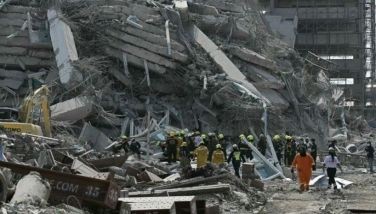Israel: Deal reached to resettle African migrants in West

FILE - In this Feb. 22, 2018 file photo, asylum seekers march during a protest outside Israeli Prison Saharonim, in the Negev desert, southern Israel. Prime Minister Benjamin Netanyahu's office said Monday, April 2, 2018, that it has reached an agreement with the United Nations refugee agency to scrap plans to deport African asylum seekers and will resettle many in Western countries instead. Israel said it reached an "unprecedented understandings" with the U.N. in which Israel will send more than 16,000 migrants to various Western countries willing to absorb them. (AP Photo/Tsafrir Abayov, File)
JERUSALEM — The Israeli government announced on yesterday that it has reached a landmark agreement with the United Nations to scrap its contested plans to deport African asylum seekers and would resettle many of them in Western countries instead.
Prime Minister Benjamin Netanyahu's office said the "unprecedented understandings" with the UN refugee agency would send more than 16,000 migrants to various Western countries that are willing to absorb them. It said the new deal would be implemented in three stages over five years, with much of those remaining in Israel integrated and granted official status.
Netanyahu and his interior minister, Arieh Deri, are to make a formal announcement shortly, according to the prime minister's office.
The deal lifts the threat of a forced expulsion to unnamed African destinations, widely believed to be Rwanda and Uganda, with whom Israel had reached a secret agreement.
The Africans, nearly all from dictatorial Eritrea and war-torn Sudan, say they fled for their lives and faced renewed danger if they returned. Israel has said it considers the vast majority of the 35,000-40,000 migrants to be job seekers and has said it has no legal obligation to keep them.
Critics at home and in the Jewish American community have called the government's proposed response unethical and a stain on Israel's image as a refuge for Jewish migrants.
The world is grappling with the worst refugee crisis world-wide since World War II, something that has struck a raw nerve in Israel, which was established in the aftermath of the Holocaust.
The optics of black asylum seekers accusing the country of racism has turned into a public relations liability for Israel, and groups of Israeli doctors, academics, poets, Holocaust survivors, rabbis and pilots have all appealed to halt the plan. Before yesterday's announcement, the government had remained steadfast, bristling at what it considered cynical comparisons to the plight of Jews in Nazi Germany.
The Africans started moving toward Israel in 2005, after neighboring Egypt violently quashed a refugee demonstration and word spread of safety and job opportunities in Israel. Tens of thousands crossed the porous desert border before Israel completed a barrier in 2012 that stopped the influx. But Israel struggled with what to do with those already in the country, alternating between plans to deport them and offering them menial jobs in hotels and local municipalities.
Thousands of the migrants concentrated in neighborhoods in south Tel Aviv, where ethnic food shops and phone card stalls line the streets, and the area has become known as "Little Africa." This has sparked tension with the working-class Jewish residents who have been putting pressure on the government to find a solution.
Netanyahu's office said that legal obstacles and ensuing problems with the proposed third-country African destinations forced the government to amend its plans and come to an agreement under UN auspices. It says the new framework will include a development and rehabilitation plan for southern Tel Aviv.
The protests also appear to have played a part.
The government had previously said that women, children and families, for example, would be exempt from the deportation order, as well as those who escaped the genocide in Sudan's western region of Darfur. Those it did not detail the proposed breakdown, those who will leave Israel are likely to mostly be single men from Eritrea — where the regime is one of the world's most oppressive and men are forced into a military service with slavery-like conditions.
Monim Haroon, a 28-year-old university student in Jerusalem who fled Darfur five years ago, said he was relieved to hear that a just solution had been found and he would be able to stay in Israeli without worry.
"As asylum seekers we don't care where we are going to be as long as it is a safe place and these countries are willing to protect us and we can live with human dignity," he said. "If we will get status here in Israel there are a lot of things we can learn about how to build our country when we are able to go back. Israel is like a school for us."
- Latest
- Trending
































